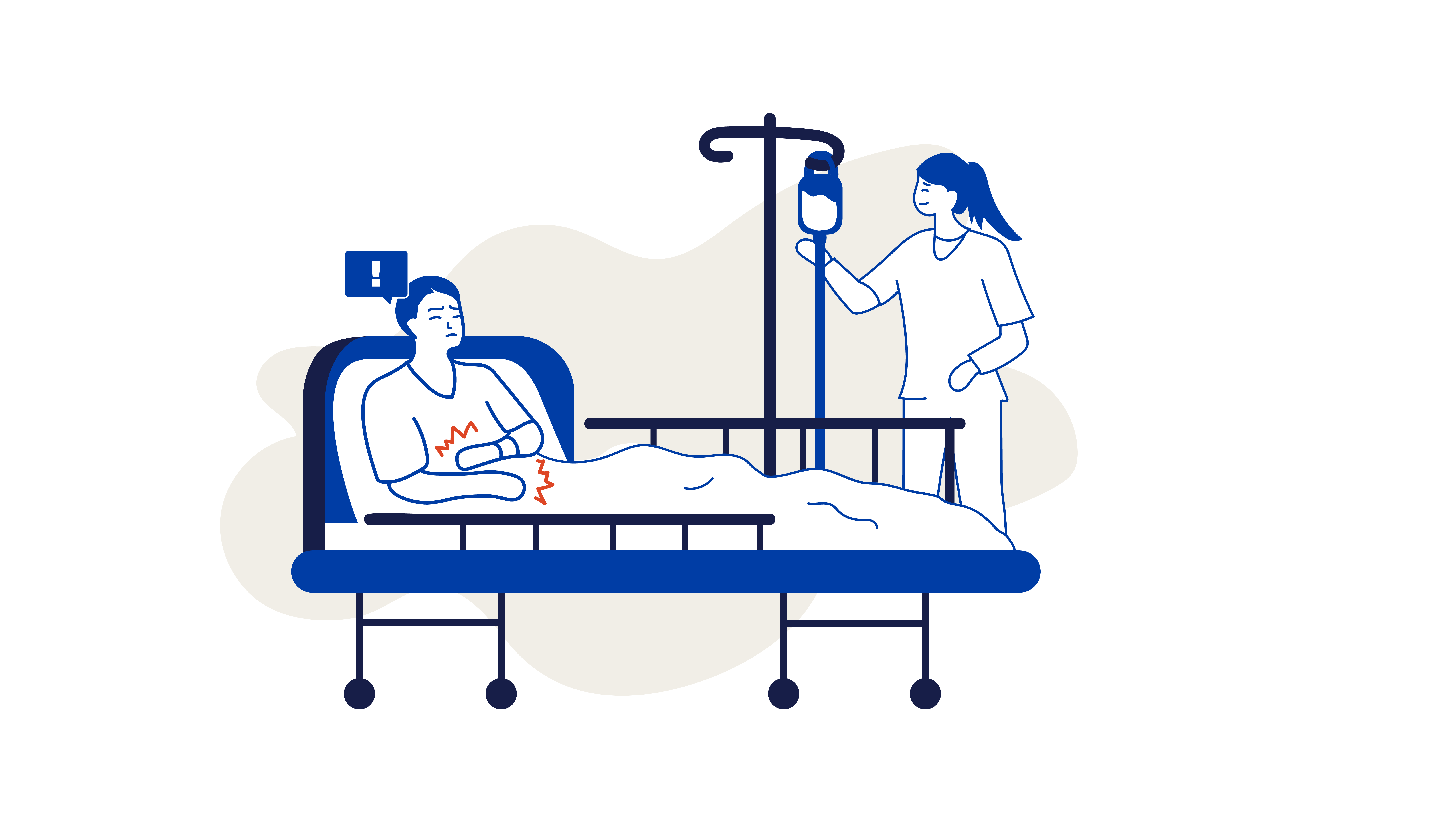Surgery & Ostomy
Back to Education & Resources
Table of Contents
Nobody loves having surgery, but it’s a promising option for colorectal cancer patients. The goal of colorectal surgery is to remove cancer from your body. Sometimes surgery can remove all your cancer; sometimes it can only remove some of it. Colorectal cancer surgery can be an effective and efficient step in your treatment plan.
Colon cancer
If you’ve been diagnosed with colon cancer, your first treatment step may be surgery to remove the primary tumor, especially if it is a small or early tumor that can be entirely removed with the portion of affected colon.
Surgery and the subsequent examination of the removed colon and tumor will also allow doctors to assign a pathological stage to your cancer, which offers a better picture of the cancer’s extent and helps guide further treatment options.
A polypectomy, or local excision, removes a cancerous polyp from the body via colonoscopy without an abdominal incision, may take place for pre-cancerous polyps or in people who cannot tolerate abdominal surgery.
All other cancers (clinical stages I, II, III and IV) may require open or minimally invasive abdominal surgeries.
Rectal cancer
If you have been diagnosed with rectal cancer, you will likely be treated with radiation and chemotherapy before surgery. For females of child-bearing age with rectal cancer, an ovarian transposition may be recommended for fertility preservation prior to radiation therapy. Egg freezing in women or sperm banking in men is also an option prior to rectal cancer treatment because of the rectum’s close proximity to pelvic nerves and sex organs.
Living with an Ostomy
Get straightforward guidance on living with an ostomy—from what surgery involves to how to adjust afterward and regain confidence in daily life.
Watch & Wait
In some rectal cancer patients, neoadjuvant treatment (treatment given before surgery) is sufficient for treating the cancer, and patients don’t need surgery. In these cases, patients may be offered the “watch and wait” approach as an alternative to surgery. These patients will be continually reassessed and monitored via physical exam and colonoscopy or sigmoidoscopy in the weeks and months following treatment to see if the cancer grows and/or returns and warrants surgery.
Will the surgeon cut me open?
There are several surgical techniques that doctors use on colorectal cancer patients depending on the case.
Surgery methods include:
Open Surgery
Open surgery is a type of surgery where a doctor makes a long cut (incision) down the middle of the abdomen to access the area where the surgery needs to be done. This type of surgery is usually done when the area being operated on is hard to reach, or when the surgeon requires a larger opening to see and work in the area.
After surgery, the incision will be closed. The abdominal muscles are closed with sutures, and the skin will be closed with stitches or staples. Open surgery usually requires a longer recovery time and can be more painful than minimally invasive surgery. However, sometimes open surgery is the best option for certain situations.
Minimally Invasive Surgery
Laparoscopic Surgery
Laparoscopic surgery uses multiple small incisions instead of one long cut. The doctor inserts a tiny camera and small tools into the incisions to remove the cancer. This can make recovery time shorter and less painful.
Robotic-assisted Surgery
Robotic-assisted surgery is like laparoscopic surgery, but the doctor uses a console in the operating room to control tools held by a robotic machine. This method allows the doctor to perform the surgery with more precision, flexibility, and control. Recovery time with this technique may also be shorter compared to open surgery.
What kind of surgery will I need?
There are several types of colorectal surgery. You’ll need to talk with your doctor about their recommendations depending on your diagnosis and your other health conditions.
Polypectomy
Local Excision
Colectomy and Proctectomy
- Right Hemicolectomy or Left Hemicolectomy – remove right or left side of the colon
- Partial Colectomy/Subtotal Colectomy – remove some or most of the colon (technically LAR is in this category)
- Total Colectomy – remove all of the colon
- Proctectomy – remove all or part of the rectum
- Proctocolectomy – remove part of the colon and rectum
- Total colectomy with proctectomy – remove colon, and rectum
- Abdominoperineal resection – remove colon, rectum and anus (for low rectal tumors or anal tumors)
A colectomy may be performed using traditional open techniques, laparoscopically, or robotically assisted.
Colostomy or Ileostomy (Ostomy)
A colostomy surgery happens when a section of large intestine has been removed, and the stoma is created with the large intestine.
An ileostomy is when the entire colon is either removed and/or the colon needs to be bypassed, so it can heal after a resection. In this case, the small intestine is connected to the stoma. Both a colostomy and an ileostomy can be temporary and reversed, or permanent.
Colostomy/ileostomy Reversal Surgery
Low Anterior Resection (LAR)
Abdominoperineal Resection (APR) with Ostomy
Colorectal Cancer Surgery Methods
What about surgeries outside of the colon or rectum?
In cases of colorectal cancer metastasis, additional surgeries on the liver, lungs, abdomen, uterus/ovaries, bladder, and brain may also be needed. It’s important to speak with your doctor about your treatment plan and course of action, and which surgeries need to come first. Your treatment plan will be unique to your case.
Many patients who will undergo intravenous treatment will also have a port-a-cath placed (also called a port). The port will be placed during a relatively quick procedure while you are under sedation.
What should take place before surgery?
Before surgery, you’ll need several tests. Some of these tests may have been what led you into surgery. Some will inform your doctors on the extent of your cancer and guide your next steps:
- Colonoscopy
- Biopsy of any polyps or areas of concern
- Mismatch repair (MMR) or microsatellite instability (MSI) testing – performed on your tumor
- Blood tests (CBC, chemistry profile, CEA level)
- CT with contrast of chest, abdomen, pelvis
- Additional imaging tests like MRI, PET, and endorectal ultrasounds may also be ordered
What to expect during the pre-op hospital visit
Before surgery, you will need to schedule a pre-op visit at the hospital where your surgery is taking place. The hospital should reach out to you to schedule this; however, be sure to advocate for yourself. If the hospital does not call you, call the hospital and double-check you’re on the surgery schedule and ask to set this critical appointment.
Depending on the type of surgery you have planned, the following may take place:
- Labs will be drawn
- Medical history intake (be sure to know your current medications and dosages)
- For ostomy surgery: You should meet with an ostomy nurse who will help mark where your stoma should be placed and answer any pre-surgical questions about your ostomy.
- You may also be invited to a class for education on your surgery and how to recover immediately following.
During this visit, payment may be due. When you set your pre-op- appointment, ask if any money will be due that day and/or what fees to expect.
How can I prepare for colorectal cancer surgery?
What side effects should I expect after surgery?
Nasogastric Tube (NG Tube)
- Chafing around the nose
- Sore throat
- Irritation and aggravation (Although temporary, many find this tube uncomfortable.
Pain
- Near your incision site(s)
- Your shoulders and neck (This is common immediately following anesthesia.)
- Headache
Nausea/Vomiting
Leakage
Restricted Diet
Depression and Anxiety
As you recover from surgery, check in with yourself regarding your mental health and emotions. Invite friends to ask you questions about how you’re doing and feeling. Be honest with the medical professionals caring for you and let them know if you’re feeling down and anxious. There are both medication and non-medication options to help you through challenges.
Colorectal Cancer Surgery Recovery
What is recovering from colorectal surgery like?
Different methods of surgery have varied recovery times. You need to be prepared. Following your surgery, you will likely want to lay low, but movement is key. Get up and walk as much as you’re able.
Your diet will progress as you recover. You will be on NPO (nothing by mouth) immediately following surgery, but you’ll progress to ice chips and clear liquids. From there, you’ll move on to full liquids, and if you tolerate those well, you’ll likely have more food choices. You’ll want to choose soft foods, and foods without fiber.
A low-residue diet will likely be advised for several weeks as you’re recovering. A low-residue diet is a diet low in fiber, which minimizes the amount of work for your colon and rectum. Think “white bread and white rice, not whole grain bread and brown rice,” and avoid foods like raw vegetables, nuts and seeds, whole grain products, beans, and fried meats.
Many patients spend most of their recovery time at home once released from the hospital. A few things to line up as you plan recovery:
- Mobility around the house – make sure you have a bed and chair that you can get to easily.
- Groceries – have someone stock your kitchen with foods you’ll need after surgery.
- Transportation – your doctor will let you know when you’re cleared to drive after surgery. Have rides lined up until you can drive again.
What if surgery isn’t an option for me?
Some patients are inoperable either because of the size/location of their tumors, it’s metastatic, and/or their health does not permit it. In this case, there are still treatment options like chemotherapy, targeted therapy, immunotherapy, and radiation therapy.
Let your doctor know your thoughts about how to proceed with treatment if surgery is not an option for you, and always consider getting a second opinion and searching for clinical trials.
Also, even if you do not undergo surgery, you’ll want to ask your doctor to perform tumor testing on a biopsy of your tumor so you can identify your biomarkers.
What will I find out after surgery?
After your surgery, you will receive information that will guide your next steps. This can include:
- Pathology report with a pathological diagnosis. This will determine the pathological stage of your cancer.
- MMR/MSI testing results – everyone diagnosed with colorectal cancer should have this test performed. Ask your doctor to make sure to test for this and ask for the results.
- Biomarkers report – Ask your doctor to perform tumor testing for biomarkers. This is invaluable information, especially for stage IV patients. Your biomarkers will determine which treatments you will/will not be eligible for.
You will see your surgeon (or someone on their team, like their physician assistant or nurse practitioner) every day while you’re in the hospital. It’s important to attend all your follow-up visits once you’re released.
If you have colorectal cancer, it’s important to make sure you’ve set up follow-up visits not only with your surgeon, but also your oncology team.
Surgery Webinar
Explore surgical options for both primary and metastatic colon and rectal cancer and dive into the different types of surgery such as robotic, laparoscopic, and minimally-invasive surgery. In addition, learn how to prepare for and what to expect from surgery.



